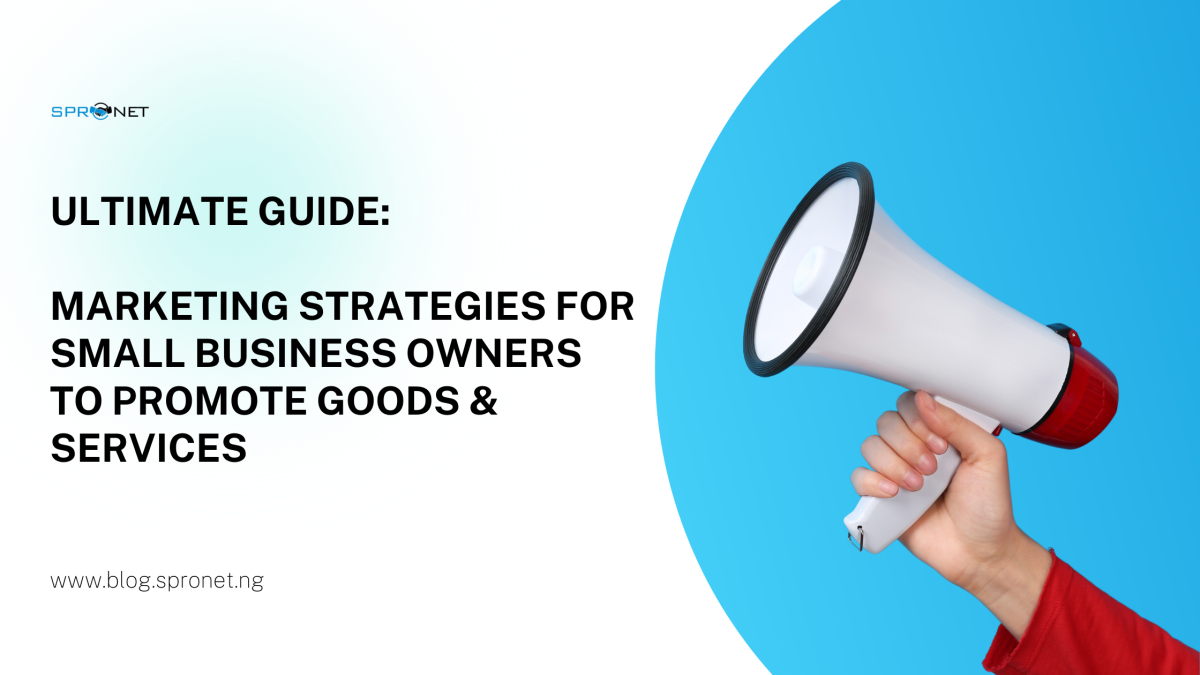Marketing Strategies for Small Business Owners
In the ever-evolving landscape of business, effective marketing is the linchpin for small business success.
Whether you’re a startup or an established small business owner, the right marketing strategies can propel your goods and services to the forefront of your target audience’s minds.
In this article, we will delve into a variety of Marketing strategies for small business owners that can be employed to effectively market and promote goods and services.
1. Understand Your Target Audience As A Small Business Owner:
Marketing success begins with a clear understanding of your target audience.
Conduct thorough market research to identify their needs, preferences, and pain points. Creating detailed buyer personas helps tailor your marketing efforts to resonate with specific customer segments.
2. Craft a Compelling Value Proposition:
Your value proposition should clearly communicate the unique benefits your goods or services offer to customers.
Highlight how your offerings solve their problems or fulfill their desires. A strong value proposition sets the stage for effective marketing messaging.
3. Build a Professional Website:
In the digital age, your website is often the first point of contact for potential customers.
Ensure it’s well-designed, user-friendly, and optimized for search engines.
Incorporate relevant keywords in your website’s content and meta tags to improve its visibility on search engines.
4. Implement Content Marketing:
Content marketing involves creating valuable and relevant content to attract and engage your target audience.
Develop a content calendar that includes blog posts, videos, infographics, and ebooks.
Provide informative, educational, or entertaining content that establishes your expertise in the industry.
5. Leverage Social Media Marketing:
Harness the power of social media platforms such as Facebook to connect with your audience on a personal level.
Choose the platforms most relevant to your audience and industry.
Regularly share engaging content, respond to comments, and use targeted advertising to reach potential customers.
Are you a small business owner interested in learning how to harness the power of Social Media Advertising to grow your business and gain more paying customer?
Check out The Master The Art Of Social Media Advertising Course on by Sprolearns.
It’s a comprehensive, Beginner (Zero Knowledge) to Advanced course for Business Owners, Marketers and young Professionals .
6. Email Marketing and Lead Nurturing:
Build an email list of interested prospects and loyal customers.
Send targeted emails with valuable content, promotions, and updates.
Implement lead nurturing workflows that guide potential customers through the buying journey, building trust and increasing conversion rates.
7. Master Search Engine Optimization (SEO):
SEO is a cornerstone of online visibility.
Conduct keyword research to identify relevant search terms and optimize your website’s content accordingly.
Focus on both on-page and off-page SEO tactics to improve your website’s search engine rankings.
8. Explore Pay-Per-Click (PPC) Advertising:
PPC advertising, such as Google Ads, allows you to bid on keywords to have your ads displayed to relevant users.
Craft compelling ad copy, choose effective keywords, and set a budget.
Monitor and adjust your campaigns based on performance data.
9. Local SEO and Google My Business:
For businesses with physical locations, local SEO is crucial.
Optimize your Google My Business profile with accurate information, images, and customer reviews.
This helps your business appear in local search results and on Google Maps.
10. Online Marketplaces & Business Communities
Utilizing online marketplaces has evolved into a strategic maneuver for proprietors of small businesses.
The concept of marketplaces has a historical lineage in the business realm.
While the methods of transactions and technological aspects have shifted with time, marketplaces persist as a practical avenue for buyers and sellers hailing from distant geographical locations to discover one another and engage in transactions.
Being affiliated with a respected marketplace such as spronet.ng lends authenticity to your business and amplifies the exposure of your brands, goods, and services.
Marketplaces function as generators of business traffic, perpetually orchestrating promotions and marketing initiatives to allure other businesses and buyers into the marketplace.
SEE ALSO: Why Your Business Needs An Online Marketplace
11. Create High-Quality Visual Content:
Visual content, including images and videos, can be more engaging and memorable than text alone.
Invest in high-quality visuals that showcase your products or services in action.
Visual content is highly shareable and can help your brand go viral.
12. Engage with Online Reviews:
Positive reviews and testimonials can significantly influence purchasing decisions. Encourage satisfied customers to leave reviews on platforms like Google, Yelp, and social media.
Address negative reviews professionally and use them as opportunities for improvement.
13. Harness the Power of Influencer Marketing:
Identify influencers in your industry who align with your brand’s values and target audience.
Collaborate with them to create authentic content that introduces your products or services to their followers, expanding your reach and credibility.
14. Monitor and Analyze Data:
Regularly monitor the performance of your marketing efforts using tools like Google Analytics.
Track website traffic, conversion rates, social media engagement, and other relevant metrics. Use this data to refine your strategies and optimize your campaigns.
In Conclusion:
The world of marketing for small business owners is dynamic and multifaceted.
By understanding your audience, crafting a compelling value proposition, and leveraging various marketing channels – from content marketing to social media and beyond – you can effectively promote your goods and services.
Implement a mix of strategies tailored to your business’s unique strengths and objectives.
Continuously monitor and adapt your approach to stay ahead in an ever-changing market, ultimately achieving growth, brand recognition, and customer loyalty.


[…] to take your customer to the next level? Read our post 14 Marketing Strategies for Small Business Owners to Promote Goods & Services and discover various ways to make make your business […]